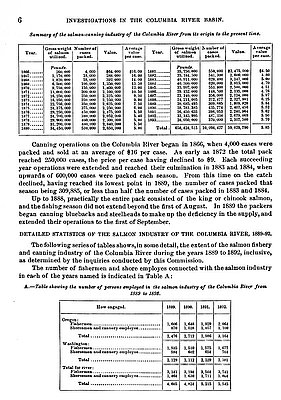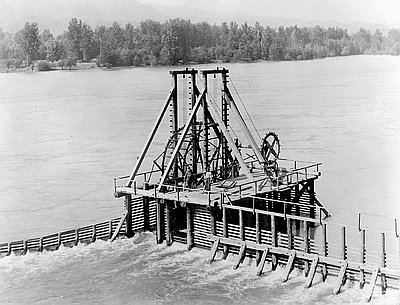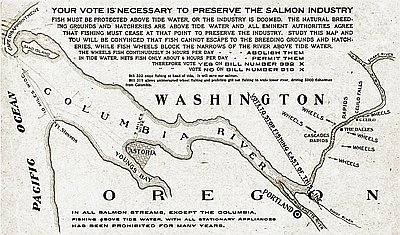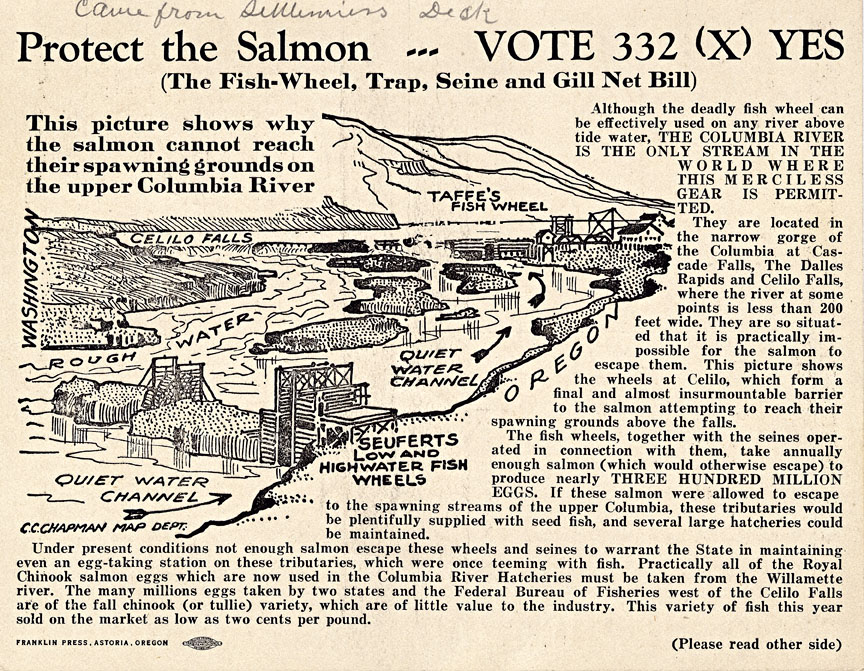- Catalog No. —
- Mss 1102-2-20
- Date —
- 1908
- Era —
- 1881-1920 (Industrialization and Progressive Reform)
- Themes —
- Environment and Natural Resources, Government, Law, and Politics, Trade, Business, Industry, and the Economy
- Credits —
- Oregon Historical Society
- Regions —
- Columbia River
- Author —
- Fish Conservation Committee
Protect the Salmon - Vote 332 (X) Yes
This card was distributed by the Fish Conservation Committee, a political group organized to promote a 1908 initiative that sought to ban fishwheels and other forms of commercial salmon fishing in the Columbia River above tidewater. This initiative effort was led by lower Columbia River gillnetters, purportedly to “protect the salmon,” as stated in the card reproduced here. The gillnetters argued that fishwheels blocked salmon from migrating upstream and that they were responsible for destroying the upper Columbia’s salmon runs. After failing to convince the state legislature to ban fishwheels on the Columbia, gillnetters took the issue directly to the voters in 1908, making use of the state's new initiative system. Their bill banned commercial fishing above the Sandy River, where all the fishwheels on the river were located.
Fishwheel owners responded by submitting their own bill, which severely limited gillnetting in the lower Columbia. Ed Rosenberg, secretary of the United Fishermen of the Pacific in Astoria, called the wheelmen’s initiative a “trick bill” designed to “fool the people of the State,” while the wheelmen referred to the gillnetters’ initiative as the “hog-it-all” bill.
The people of Oregon passed both initiatives on June 4, 1908, effectively shutting down commercial fishing on the Oregon side of the Columbia River. One newspaper remarked sarcastically that the two laws abolished “fishwheels, fishtraps, gillnets and fishing of all kinds on the Columbia except fishing with a string and a bent pin.”
Both upper-river and lower-river fishermen vowed to disobey the new laws, arguing that the laws were unconstitutional and that their licenses allowed them to fish for the rest of the year. Oregon’s Master Fish Warden, H.C. McAllister, attempted to enforce the laws, arresting dozens of fishermen on both the Oregon and Washington sides of the river. The governor of Washington protested that Oregon officials had no jurisdiction in Washington waters, and a federal judge quickly issued a temporary injunction barring Oregon from enforcing the new laws.
Although Oregon and Washington had long considered a joint-management arrangement to avoid such conflicts, the initiatives of 1908 finally spurred the states to act. Legislators from both states hammered out a deal that harmonized fishing regulations on the Columbia. Part of the deal included the repeal of both the gillnetters’ and wheelmen’s initiatives. This initial bi-state agreement led to the 1918 Columbia River Compact, a cooperative management agreement that is still in effect.
Further Reading:
Cone, Joseph, and Sandy Ridlington, eds. The Northwest Salmon Crisis: A Documentary History. Corvallis, Oreg., 1996.
Taylor, Joseph E., III. Making Salmon: An Environmental History of the Northwest Fisheries Crisis. Seattle, Wash., 1999.
Written by Cain Allen, © Oregon Historical Society, 2006.
Related Historical Records
-
Salmon Decline, 1894
This document is an excerpt from an 1894 report by the U.S. Commissioner of Fish and Fisheries Marshall McDonald. It describes the decline of salmon in the headwaters of …

-
Columbia River Fish Wheel
This undated photograph of two men standing on the deck of a stationary fish wheel was taken by Benjamin A. Gifford, a professional photographer working from Portland, Oregon. …

-
Advertisements, Salmon Fishery Initiatives, 1908
These two advertisements were published in the spring of 1908. The first document, titled “Your Vote is Necessary to Preserve the Salmon Industry,” represents the views of lower …

